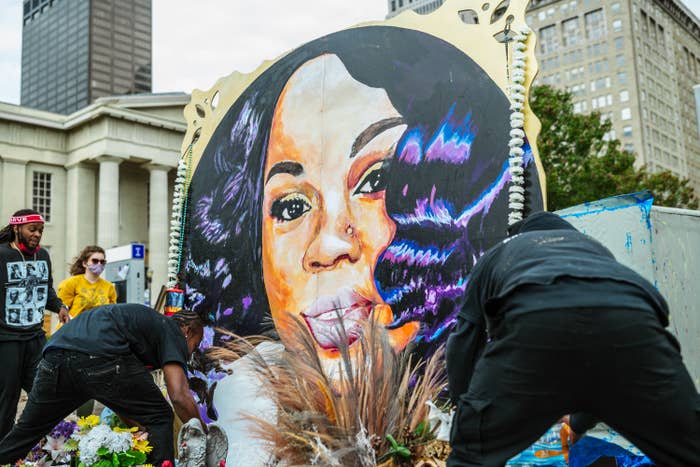
The Kentucky attorney general released about 20 hours of audio recording from the grand jury that decided not to charge the three officers involved in Breonna Taylor's shooting with her death.
The decision to release audio of the proceedings, which typically remain secret, give the public a look into the evidence that Kentucky Attorney General Daniel Cameron presented in the case.
“I’m confident that once the public listens to the recordings, they will see that our team presented a thorough case to the Jefferson County Grand Jury,” Cameron said in a statement following the audio's release. “Our presentation followed the facts and the evidence, and the Grand Jury was given a complete picture of the events surrounding Ms. Taylor’s death on March 13th. While it is unusual for a court to require the release of the recordings from Grand Jury proceedings, we complied with the order, rather than challenging it, so that the full truth can be heard.”
The audio, which includes witness testimony from Taylor's boyfriend, Kenneth Walker, as well as the officers involved in the fatal shooting, paints conflicting pictures of what happened the night Taylor was killed. The recordings do not include which charges the prosecutors recommended the grand jury should consider.
In the recording, one officer, Shawn Hoover, claimed they knocked on the door several times and announced themselves as police before entering the apartment, according to the Courier Journal. He said he believed Walker and Taylor were aware it was police knocking at their door.
When no one came to the door the officers said they broke down the door, saying, "Police, search warrant. Police, search warrant."
"In my opinion, we were ambushed,” Hoover said. “They knew we were there. Hell, the neighbors knew we were there upstairs. They were coming out to see.”
But Walker disputed Hoover's claims, telling investigators that when he and Taylor heard banging at the door, they asked who was there and did not hear an answer, according to the New York Times. Walker said he and Taylor yelled "Who is it?" and when there was no reply, he grabbed his gun.
Walker told investigators he and Taylor were watching a movie in the dark when they heard the knocking. They both got up and started dressing as Taylor was asking “at the top of her lungs” who was at the door, the New York Times reported.
He said Taylor was walking out of the bedroom to the door when he saw the door go off its hinges. He said he was "scared to death," and when the officers busted the door open, he fired one shot immediately. The officers returned fire with 32 bullets.
“All of a sudden, there’s a whole lot of shots,” Walker said.
“Next thing I know, she’s on the ground and the door’s busted open and I hear a bunch of yelling and just panicking,” Walker said. “And she’s right here bleeding. And nobody’s coming, and I’m just confused and scared.”
Walker said that right after the shooting, a uniformed officer told him he was going to jail for life. He said the officer asked if he was hit by any of the bullets, and when Walker said no, the officer responded, “That’s unfortunate.”
Walker told investigators that he did not know which officer said that, but it definitely was a uniformed officer, and those were his "exact words" to Walker.
Last week, the grand jury announced that Brett Hankison, one of the three police officers involved in the fatal shooting of Taylor, will be charged for wanton endangerment — not in connection with her death, but for shooting into a neighboring apartment.
After the announcement, thousands of people took to the streets across the country to protest the lack of charges.
Cameron agreed to release the audio after a grand juror asked for the recordings to be released and for permission to speak publicly about the case. The juror accused the Kentucky attorney general of using the jurors "as a shield to deflect accountability and responsibility."
The attorney general admitted that he had, in fact, not recommended any charges to the grand jury for the officers involved in killing Taylor, calling it "not appropriate" in a sit-down interview with WDRB.
He said that while his office only recommended the charge of wanton endangerment, it did present all the evidence from the investigation to the grand jury over two and a half days.
"They are an independent body," he told WDRB. "If they wanted to make an assessment about different charges, they could have done that."

